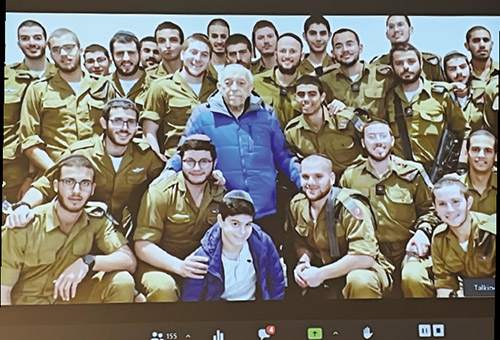




On April 27 the Young Israel of New Rochelle hosted the Yom HaShoah 5782 community-wide Holocaust Memorial program, annually co-sponsored by all the lower Westchester Orthodox shuls.
YINR’s Rabbi Reuven Fink talked about Rabbi Chaim Mordechai Katz, a rosh yeshiva of the Telshe Yeshiva, who survived the Holocaust after losing his wife and 10 children. Rabbi Fink explained that “Rabbi Katz was renowned in the Torah world, a man strong as steel, almost never portraying any weakness.” Katz came to the United States, remarried and had children and grandchildren.
One day, his gabbai saw Rabbi Katz crying uncontrollably. He was shocked because nobody had ever seen him show any weakness. Katz said he was trying to remember the names of his 10 children who were killed. “Now they’re really dead. That’s why I am crying. Not to remember the names is death.” Fink explained: “As long as a person is remembered, they’re truly not dead. We who have gathered here tonight have demonstrated our commitment to never forget.”
The keynote speaker was Marion Blumenthal Lazan. She described her family living comfortably in 1930s Germany; her father ran a successful shoe business in a small town. Life began to change for them after the Nuremberg Laws and then Kristallnacht. In 1938, her family received the necessary papers to emigrate. Lazan was just 4 years old at that time. On Kristallnacht, her father was detained, but released after three weeks because their American papers were in order, and two years prior, he had been awarded the Iron Cross for his German military service in World War I. The family left Germany for Holland with plans to sail to America. For nine months, they waited for their quota number. In May 1940, one month before their planned departure, the Germans invaded Holland and they were trapped. Their belongings, already loaded aboard ships, were destroyed as the harbor was bombed.
In January 1944, Lazan’s family was deported to Bergen-Belsen. “I was a fairly frightened 9-year old. To this day, I still feel a certain sense of fear whenever I see a German shepherd barking.” The family was sent to the “Star” section as they continued to wear the yellow star. This section of the camp was for people whom the Germans hoped to exchange for German nationals in Palestine.”
Lazan continued: “Every morning, we were ordered to line up on a huge field. We would have to stand there until each of us was accounted for, often from early morning to late at night, without food and no matter what the weather. Our daily diet was a slice of bread and watery soup. Once a month, we went to an area to shower. We had heard about exterminations and gas chambers and were never sure when the faucets were turned on, what would come out.
“We, as children, saw things that no matter what age, should ever have to see.” Lazan made up a game. Finding four pebbles of about the same size and shape meant the family of four would all survive. “It was a torturous, painful, very difficult game to play.”
In Spring 1945, Auschwitz had already been liberated. Now 10, Lazan and the
remaining population of the camp were sent east by train. After two weeks on the train, they were liberated by the Russians. She weighed 25 pounds and her mother 70 pounds. “It was a wonderful, exciting feeling to be free.” Six weeks after liberation her father died of typhus.
After the war, three surviving Lazans returned to Holland, and then relocated to Peoria, Illinois, where Lazan learned English and met her husband. Today, she has three married children, nine grandchildren and seven great-grandchildren. In March 1996, Lazan’s book “Four Perfect Pebbles: A Holocaust Story” was released. “I am so grateful that the stories are in book form so that it can be passed on to future generations.”
“Although I’ve spoken to upwards of a million and a half people over 25 years, it still has not become easy,” Lazan said. “However, I realize the importance of sharing that period of our history, particularly with our younger generation, simply because in a few short years, we will not be here any longer. Today’s generation is the very last generation to hear the stories firsthand.”
To learn more about Lazan and her story visit https://www.fourperfectpebbles.com/.
By Judy Berger










